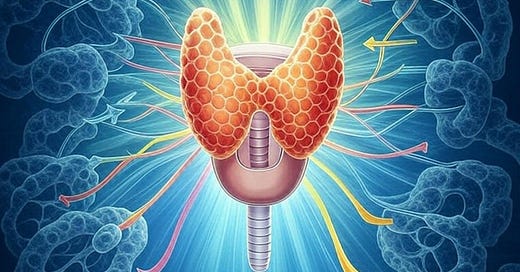Your thyroid gland is the master metabolic thermostat of the body. When your thyroid is functioning optimally, life is good. It’s easier to maintain a healthy body weight. Energy levels are high. Cognitive function is sharp. When your thyroid is on the fritz, you can feel like you’re trudging through six inches of mud in a broken pair of gas station flip flops. Life. Is. A. Drag.
In my experience, most doctors never take a great look at thyroid labs. In today’s article, I will share with you some lab markers that your doctor isn’t checking. For my paid subscribers, I’ll include a section at the end showing my optimal levels for each of these labs. Let’s dive in.
Major Functions of Thyroid Hormones
As a major player in the body’s metabolism, your thyroid is at the center of all things related to energy. Thyroid hormones will increase your metabolic rate—your ability to use fats and carbohydrates for energy. Thyroid hormones impact cardiovascular function, they stabilize mood, help you regulate body temperature, influence sex hormones like testosterone and estrogen, and support muscle growth and bone turnover.
Thyroid Labs to be Checking
This is a conversation I’ve had many times over. Plain and simple: most doctors are not ordering enough labs to fully evaluate thyroid function. Let’s say you go to your “annual physical” and your doc orders “a bunch of labs.” This annual lab panel will measure one—maybe two—thyroid markers. Your doctor will order “TSH with reflex to T4.”
In lab-speak, “with reflex to…” means that if the first marker comes back in “normal range”, then that’s as far as they’ll check. That’s all she wrote. Nothing to see here. The T4 is never measured, because it’s assumed that if TSH is normal, then everything else must be just fine. I’m here to tell you that this is the wrong way to do it. Normal isn’t optimal. Sadly, this happens over and over again in doctor offices all around the country.
At a minimum, there are six markers that should be checked. Here they are:
TSH - Thyroid Stimulating Hormone / The signal from the brain to your thyroid glad, telling it to make thyroid hormone. This hormonal signal is coming from the pituitary gland. This is like the boss telling his or her employees what to do. If the employees aren’t working efficiently, the boss raises his or her voice, and TSH goes up.
Free T4 / The major form of thyroid hormone that is produced in the thyroid gland itself. Labs can measure “total T4,” or “free T4”. I prefer to measure the “free”, as this is the form of T4 that is unbound and circulating in the blood stream.
Free T3 / For me, this is the rockstar of all the thyroid hormones. This is sometimes referred to as the “active” form of thyroid hormone. T4 is converted to T3 in the liver, and circulating T3 is what will attach to thyroid hormone receptors and do the work of the thyroid. A major function of T3 involves its influence in the mitochondria to produce cellular energy.
Reverse T3 / The metabolic garbage can for thyroid hormones. Under situations of stress, inflammation, poor nutrition, high cortisol, or lack of exercise, the body will do whatever it can to preserve energy. One way it does this is by diverting conversion of T4 to T3 by instead making Reverse T3. This is a metabolically inactive version of T3.
Thyroid antibodies (TPO, TG Ab) / A common reason for hypothyroidism (low-functioning thyroid) is an autoimmune condition known as Hashimoto’s Thyroiditis. The body’s immune defenses are misdirected toward the thyroid gland, lowering its function and potentially affecting metabolism. Two blood tests that can be run to detect this are Thyroid Peroxidase Antibodies (TPO) and Thyroglobulin Antibodies (TG Ab). TPO is an enzyme required in the creation of thyroid hormone T4. Thyroglobulin is a protein in the thyroid gland that helps you produce thyroid hormone T4. If either of these antibodies are elevated, this could mean Hashimoto’s or Grave’s Disease.
A phrase you’ll hear me say over and over is with better information, we make better decisions. Hormones are a complicated web of signals that run the entire body. Today’s article focuses on thyroid hormones specifically, but the thyroid certainly doesn’t operate in isolation. The human body is the most complicated system in the universe. Hopefully this helps you sort out a few details you didn’t know before. If you’ve ever been diagnosed with a thyroid issue, or suspect you may have one, find yourself a doctor who will run these labs for you. And if you can’t find one, maybe I can help!
Paid subscribers will have access below to my Optimal Thyroid Lab Values:
Keep reading with a 7-day free trial
Subscribe to Doctor's Note to keep reading this post and get 7 days of free access to the full post archives.





